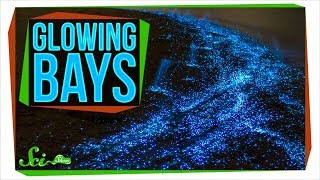On most beaches, the only light you'll see in the water at night is the reflection of stars or streetlights.
在大部分夜晚的海滩中,你能在海水中看到的唯一光亮是星星的倒影或街灯。
But in a few special places around the world, the ocean lights up at night with countless tiny blue flashes.
但在世界几个特别的地方,夜晚的海洋会发出无尽的微弱蓝色闪光。
These bioluminescent bays look pretty magical, but it really all comes down to science.
这些荧光海湾看起来很神奇,但这一切都归结为科学。
Specifically, this stunning natural phenomenon is caused by tiny creatures called dinoflagellates and some cool chemistry inside them.
更确切地说,这种美丽的自然现象是由鞭毛藻类微生物和其中一些很酷的化学物质引起的。
Dinoflagellates are single-celled organisms called protists, which are a ragtag bunch of eukaryotes.
鞭毛藻是一种被称为原生生物的单细胞生物,这种原生生物是一群真核细胞。
Their DNA is neatly organized in a nucleus, unlike bacteria.
和细菌不同,它们的DNA灵活地排列在一个细胞核之中。
But protists don't fit nicely into other eukaryotic groups like plants, animals, and fungi.
但原生生物和其他真核生物,比如植物、动物和真菌格格不入。
Many species of dinoflagellates are microscopic,
很多种类的鞭毛藻都是微观的,
although some can grow up to 2 millimeters in diameter, like Noctiluca scintillans, also known as the sea sparkle.
虽然一些种类的鞭毛藻的直径可达2毫米。比如夜光藻,也被称为海耀。
And that's pretty big for a single cell! Dinoflagellates live in marine and freshwater environments all over the world.
这种尺寸对单细胞来说已经相当大啦!鞭毛藻类生活在全世界的海洋和淡水环境中。
Some are photosynthetic and need sunlight for energy. And others are heterotrophic, which means they eat other organisms.
一些是光合的,它们需要吸收阳光作为能量。其他是异养的,意味着它们会吃掉其他生物体。
Of the hundreds of species of dinoflagellates, relatively few are bioluminescent.
在数百种鞭毛藻类物种中,仅有一些是生物性发光的。
About 70 light-producing species have been discovered so far.
目前为止约发现了70种会发光的鞭毛藻。
It takes energy to do chemical reactions that emit light, so there needs to be some sort of survival benefit that makes it worth it.
其需要能量产生化学反应才能发光,因此需要有一些生存益处才值得发光。
And if you're a single-celled organism, you're at the bottom of the food chain. It's hard work to avoid getting eaten.
如果你是一只单细胞生物体,你就生活在食物链最底层。很难不被吃掉。
So scientists think that bioluminescence is actually a defense mechanism to help them escape predators like copepods, which are small shrimp-like creatures.
因此科学家们认为生物发光实际上是一种防御机制,帮助它们避开像虾一样生物的小型捕食者,比如桡足类。
When the dinoflagellate senses something moving in the water,
当鞭毛藻感知到水中有东西在移动时,
whether it's a copepod, a human hand, or even the force generated by waves on the beach, it lets off a flash.
不论是不是遇上了桡足类动物、人手,或即便是沙滩上的海浪,都会让它发光。
The tiny flash hopefully startles any nearby predators, letting the dinoflagellate get away.
希望这些微光能够吓到附近的捕食者,好让鞭毛藻溜掉。
Or the glow might be like a neon diner sign and attract larger predators that ignore dinoflagellates,
或者,这种闪光像是一种霓虹用餐信号,吸引更大的捕食者,它们会忽略鞭毛藻,
but would consider copepods just the right size for a snack.
而桡足类动物的大小正和它们的胃口。
Scientists still don't know all the biochemical details about how dinoflagellates glow, but they're puzzling it out.
科学家仍然不知道关于鞭毛藻如何闪光的生物化学细节,但他们在苦苦思索。
They think that certain kinds of motion stretches the organism's cell membrane and activates mechanical receptors.
他们认为某种运动延伸了生物体的细胞膜并激活了机械感受器。

Those receptors send a signal to scintillons,
那些感受器向生物发光粒子传送一种信号,
which are basically tiny pods inside bioluminescent dinoflagellate cells that hold all of the compounds needed to produce light.
生物发光粒子主要是生物性发光鞭毛藻细胞中的微粒,手握发光所需的所有物质。
That signal seems to make each scintillon open ion channels, to let in hydrogen ions from an adjoining sack called the acidic vacuole.
这种信号似乎让每个生物发光粒子打开了离子通道,让酸液泡中的氢离子进来。
This lowers the pH and sets a chemical reaction in motion,
这会降低酸碱值并在在动作中设定一种化学反应,
in which an enzyme called luciferase combines oxygen with a compound called luciferin.
在这一动作中,荧光素酶将氧和化合物萤光素相结合。
And when this reaction happens, it releases energy in the form of a flash of light.
当这种反应发生时,它就会以闪光的形式释放能量。
Although different forms of luciferin can produce different colors of light, dinoflagellates and many other bioluminescent marine species emit blue light.
虽然不同形式的萤光素可以产生不同颜色的光,但鞭毛藻和很多其他生物性发光海洋生物都会发出蓝色的光。
That's probably because blue light can travel farthest in water, since water more quickly absorbs the other colors in the spectrum.
这或许是因为光在水中传播速度最快,因为水可以更加迅速地吸收光谱中的其他颜色。
Now, bioluminescent dinoflagellates can be beautiful, but some of them can also be deadly.
生物性发光鞭毛藻可以很漂亮,但其中一些也可以是致命的。
Species like Pyrodinium bahamense have a dangerous neurotoxin called saxitoxin.
像巴哈马麦甲藻这样的物种含有一种非常危险的神经毒素—贝类毒素。
In humans, saxitoxin binds to sodium channels in neurons to mess them up.
在人体中,贝类毒素会和神经元中的钠通道相捆绑并扰乱它们。
This can cause symptoms like numbness, drowsiness, paralysis, and even death in extreme cases.
这会引起各种症状,比如麻痹、疲劳,极端情况下,甚至是死亡。
Saxitoxin is harmful to marine animals as well as humans, and it can build up in fish and shellfish that eat dinoflagellates.
贝类毒素对海洋动物一样有害,并且会在那些以鞭毛藻为食的鱼类和贝壳类身上肆意。
And since it's not easy to tell when a clam is sick, people can unknowingly eat toxin-filled seafood.
由于不容易分辨蛤蜊的健康与否,人们会在不知情的情况下吃掉这些有毒的海鲜。
But many other bioluminescent dinoflagellates aren't toxic at all, like the sea sparkle.
但很多其他生物性发光鞭毛藻是完全无毒的,比如夜光藻。
So you shouldn't necessarily be afraid of bioluminescent bays or anything.
所以你不必害怕荧光海湾之类的。
There are just a handful of bays in the world that consistently glow, located in tropical areas like Jamaica, Vietnam, and Puerto Rico.
世界仅小部分海湾可以闪光,它们位于热带地区,比如牙买加、越南和波多黎各。
They're delicate ecosystems because the dinoflagellates need specific conditions to thrive, like enough warmth, salinity, and nutrients.
它们都是美妙的生态系统,因为鞭毛藻需要特殊环境才能繁育,比如充足的温暖、盐分和营养。
The surrounding landscape can be important too.
周围的地形也很重要。
Pesticides and heavy metals from land can kill dinoflagellates, while decaying organic matter can be an important source of nutrients.
来自大陆的农药和重金属可以杀死这些鞭毛藻,腐败的有机物质可以是一种重要的营养源。
Natural occurrences like storms or changes in wind and water patterns can blow the dinoflagellates out of bays, leading to a drop in bioluminescence.
暴风雨或风场和水域类型变化等天然现象可以将这些鞭毛藻吹出海面,让它们落在生物发光上。
For instance, Laguna Grande in Puerto Rico still hasn't fully recovered from the effects of last year's Hurricane Maria and it's still quite dim.
例如,波多黎各的拉古纳库亚贝诺泻湖仍未从去年飓风玛利亚的影响种恢复,湖水仍然昏暗。
Other areas have occasional outbreaks of bioluminescence, including Australia, the US, the UK, and the Maldives.
其他地区偶尔会爆发生物光,比如澳大利亚、美国、英国和马尔代夫。
Scientists still don't fully understand why,
科学家们仍没有完全搞明白其中原因,
but they think that certain combinations of nutrients, salinity, and warm weather may cause these critters to overgrow.
但他们认为营养物、盐分和温暖天气的某种结合或许促成了这些小东西的过度生长。
But a bunch of dinoflagellates can also cause red tides, where there are so many of these tiny creatures that the water becomes red or brown.
一群鞭毛藻也会引起赤潮,很多这样的微生物使得水质变成红色或棕色。
Some, but not all, red tides are bioluminescent. And some can be incredibly toxic to the local wildlife.
一些,并不是所有赤潮都是因为鞭毛藻。一些赤潮对当地野生动植物是含剧毒的。
So bioluminescent dinoflagellates can be an essential food source for marine ecosystems, or produce deadly neurotoxins that harm fish and people alike.
因此生物性发光鞭毛藻可以成为海洋生态系统的一种必要食物来源,也能产生伤害鱼类和人类的致命神经毒素。
But, regardless, if you get to see a spectacularly glowing bay, you should count yourself lucky.
不管怎样,如果你能目睹壮观的荧光海湾,你应该算得上是幸运的啦。
Thanks for watching this episode of SciShow, where we feel lucky to be supported by so many wonderful patrons on Patreon.
感谢收看本期《科学秀》,能受到那些多人的支持,我们也感到很幸运。
If you want to help us create free educational videos 7 days a week, you can go to patreon.com/scishow.
如果你想帮助我们创作一周七天的免费教育视频,请登录patreon.com/scishow。











